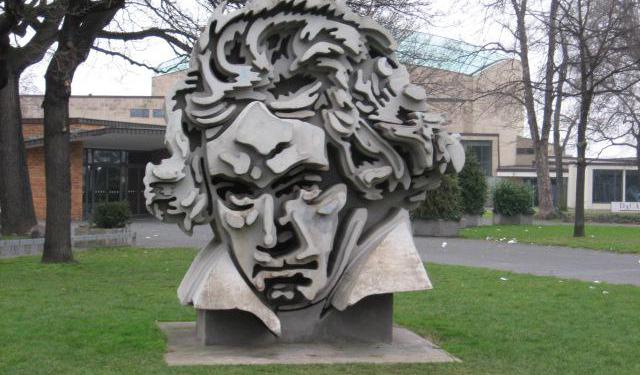Botanical Gardens and Poppelsdorf Palace, Bonn (must see)
Joseph Clemens, Archbishop-Elector of Cologne in 1715, had a problem. His old ruined castle of Poppelsdorf desperately needed a rehab. His plan was to replace the castle with a "pleasure house." He wanted it to be like the Palace of Versailles.
French architect Robert de Cotte designed the Elector's dream palace. In 1818, under Prussian rule, the Palace became part of the University of Bonn. The Park was remade as the Botanical Garden of Bonn.
Robert de Cotte's plan followed the country house concepts of the time: interior circular courtyards, audience rooms, dining rooms, a chapel and a Great Room or hall. The Palace suffered extensive bomb damage in 1944. It was rebuilt using a more simplified plan.
The Botanical Gardens currently cover 9.5 hectares of ground, of which 6.5 hectares are open to the public. The baroque garden, its arboretum and two conservatories are cared for by the university.
The outdoor portion the garden holds 3,000 species organized into four sections. The Arboretum has 700 species of woody plants, trees and shrubs. The Systemic section has 1,200 species of plants and flowers. The Geographic section plants are grouped according to geographical origin. The Biotope section is local endangered flora.
The greenhouses are the Fern House, the Mediterranean House, the Palm House, the Succulent House, and The Victorian bog House. Smaller houses contain carnivorous plants and orchids.
French architect Robert de Cotte designed the Elector's dream palace. In 1818, under Prussian rule, the Palace became part of the University of Bonn. The Park was remade as the Botanical Garden of Bonn.
Robert de Cotte's plan followed the country house concepts of the time: interior circular courtyards, audience rooms, dining rooms, a chapel and a Great Room or hall. The Palace suffered extensive bomb damage in 1944. It was rebuilt using a more simplified plan.
The Botanical Gardens currently cover 9.5 hectares of ground, of which 6.5 hectares are open to the public. The baroque garden, its arboretum and two conservatories are cared for by the university.
The outdoor portion the garden holds 3,000 species organized into four sections. The Arboretum has 700 species of woody plants, trees and shrubs. The Systemic section has 1,200 species of plants and flowers. The Geographic section plants are grouped according to geographical origin. The Biotope section is local endangered flora.
The greenhouses are the Fern House, the Mediterranean House, the Palm House, the Succulent House, and The Victorian bog House. Smaller houses contain carnivorous plants and orchids.
Want to visit this sight? Check out these Self-Guided Walking Tours in Bonn. Alternatively, you can download the mobile app "GPSmyCity: Walks in 1K+ Cities" from Apple App Store or Google Play Store. The app turns your mobile device to a personal tour guide and it works offline, so no data plan is needed when traveling abroad.
Botanical Gardens and Poppelsdorf Palace on Map
Sight Name: Botanical Gardens and Poppelsdorf Palace
Sight Location: Bonn, Germany (See walking tours in Bonn)
Sight Type: Attraction/Landmark
Guide(s) Containing This Sight:
Sight Location: Bonn, Germany (See walking tours in Bonn)
Sight Type: Attraction/Landmark
Guide(s) Containing This Sight:
Walking Tours in Bonn, Germany
Create Your Own Walk in Bonn
Creating your own self-guided walk in Bonn is easy and fun. Choose the city attractions that you want to see and a walk route map will be created just for you. You can even set your hotel as the start point of the walk.
Bonn Introduction Walking Tour
In 12 BC or thereabouts, the Roman army established in the Rhine valley, a large military encampment called "Castra Bonnensis." Literally "Fort Bonn." Built of wood at first and then replaced by stone, the fort lasted well into the 5th century AD.
The old fort materials were used to build Bonn's 13th century walls. The medieval city formed around the Romanesque church... view more
Tour Duration: 1 Hour(s)
Travel Distance: 2.4 Km or 1.5 Miles
The old fort materials were used to build Bonn's 13th century walls. The medieval city formed around the Romanesque church... view more
Tour Duration: 1 Hour(s)
Travel Distance: 2.4 Km or 1.5 Miles
Beethoven Trail
One of the most recognized music geniuses, whose works remain mainstays of the classical music repertoire around the world, Ludwig van Beethoven saw the light of day in Bonn in 1770. Needless to say that the legacy of the city’s most famous resident is highly respected and honored today. Indeed, Beethoven's presence is still very much felt throughout Bonn, encountering visitors in many... view more
Tour Duration: 1 Hour(s)
Travel Distance: 1.5 Km or 0.9 Miles
Tour Duration: 1 Hour(s)
Travel Distance: 1.5 Km or 0.9 Miles





